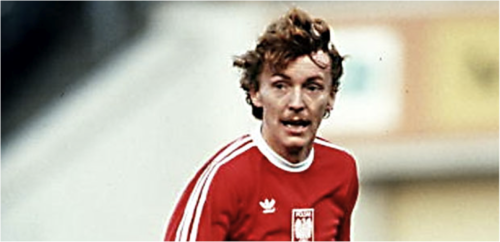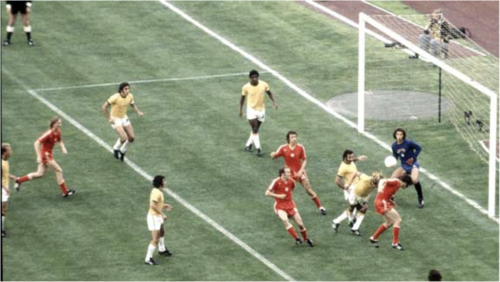Euro 2012 History of the Hosts: Poland
Euro 2012 History of the Hosts: Poland


Poland and Ukraine: the unlikely duo. This is the first of a two part series by John Ray on the history of Euro 2012’s respective hosts, allowing fans to become familiar with the two nations that will soon be placed under a microscope. Read part two here.
When top-scorer David Villa lifted the European championship trophy in 2008 it was clear that Spain had exorcised (at least some of) their demons and a seismic shift in the international game was on the way. In addition to the rise of the Spaniards, there was the arrival of the eccentric Andrei Arshavin, the breathtaking play of the Dutch in the group stage, and the “never-say-die” Turks. The competition in Austria and Switzerland ushered in a new guard in Europe as the competition has continually done.
Euro 2012 in Poland and Ukraine is sure to shape the footballing legacy of more countries. Both the host nations have been long preparing for the tournament and the 6 new stadiums, particularly those in Warsaw, Lviv, and Gdansk, look to celebrate their heritage in theatrical perfection. The excitement is quickly reaching a fever pitch with the ITV “dreams” advert and the new Nike promotion building up commercial fervor, and the lull without domestic football has made us yearn for the competition all the more. Unfortunately, Euro 2012 has also been met with early controversy as their have been fears of the racist right rearing its repulsive head that has led numerous black players’ families (particularly Alex Oxlade-Chamberlain’s) to stay at home. The jailing of ex-minister Yulia Tymoshenko has been criticized and resulted in a number of leaders boycotting the event.
The ability to overcome these concerns and stage a successful event will make Euro 2012 a watershed moment for both these countries moving forward and will hopefully continue an era of relative success for both of these countries domestically. The tumultuous histories and recent heights of Poland and Ukraine must be illuminated in order to understand this year’s competition and the significance that it carries for the countries producing it. We begin with Poland: From their escape of imperial rule in 1919, the destruction of the country in World War II, the rebuilding of the football team under the glorious tenure of Kazimierz Gorski in the 70s, and the lull until today.
Woodrow Wilson created the modern Polish state in 1918 (one of his 14 points) when he freed it from the “triple domination of Hapsburgs, Hohenzollerns, and Romanovs” (Goldblatt) and gave the nation its own state. Football, which had already been lingering around the area (the regions most prominent clubs were founded in the early 1900s), quickly became the countries most popular national sport and the Polish Football Federation was founded in 1919. The early years of the national team were rather insipid and little reported, it seems that most of the energy around the game focused on grassroots mobilization and building the foundation of the side. The Poles earned their first win over Sweden in 1922 and they kept drumming up better and better results until they were able to qualify for their first World Cup.
The 1938 World Cup in France was Poland’s first and the country would not return for a long 36 years. The side was unheralded upon arrival, but was able to play with verve and participated in one of the greatest football matches that had been seen at the time. This match, the 5 - 6 extra time defeat to Brazil, helped birth the legend of the Selecao, but it also told of Poland’s resilience and a level of skill and technique that had not previously been demonstrated. The Pole’s went into the locker room down 3 – 1 after magisterial play by Leonidas, but then a torrential downpour hit and Poland changed their tactics to take advantage of the weather and, after a last minute goal, improbably drew the match level (before going down 2-1 in extra time). Coach Marian Spoda described the attitude of the side, “Poland are not going to rigidly stick to preconceived plans. We’re very good at adapting to our opponents’ style of play and immediately discovering where their weaknesses are.” This sporting style also portended to the survivalist mentality that would come to define the populous during the dual occupation of the USSR and Germany.
World War II took a bloody and destructive excise on the state: 6 million deaths, an immeasurable amount of property damage, and intense emotional suffering. The nations football never showed the same joy in the aftermath. Poland’s hopes of becoming a world power in the sport were curtailed just as they were being conceived. The country quickly began racking up some of the most lopsided loses in the countries history (including an 8-0 drubbing by the Danes) as it attempted to rebuild from the rubble of war. This trend continued with only minor swells until the managerial tenure of Kazimierz Gorski energized the squad with real belief. His optimistic philosophy is best summated by his saying, “The ball is round and there are two goals – that is all that is certain in football”.
Under Gorski, these Minnows grew into real contenders for global honors. Winning Gold at the Munich Olympics in 1972 must have restored some sense of justice to Polish football as their first trophy came on the German soil that had destroyed so much of theirs. This victory might have alerted the hegemony of the sport to the teams growing ability, but the team still went into the 1974 World Cup as unheralded minnows. The Poles quickly went about rectifying this perceived slight by qualifying out of a tough first group by beating England, Argentina, and Haiti. In the second group stage they triumphed over Sweden, an excellent Yugoslavian side, and were only kept from winning the group over West Germany and reaching the final because of a water logged pitch and the force field like goalkeeper Sepp Maier who “[delivered] a perfect game” according to Paul Breitner. Despite being harshly eliminated, the Poles delivered a sparkling one-nil performance against former champions Brazil to win their first World Cup honor. Grzegorz Lato (who became a Polish Senator and is now the President of the Polish FA) was the star-man for the tournament, bagging 7 goals en-route to the Golden Boot and helping to finally add some luster to the Polish side.

Gorski’s managerial triumphs helped restore confidence to the countries football and ushered in an era of relative prosperity with prolific strikers Lato and Wlodzimierz Lubanski (who had missed the ’74 World Cup because of knee-ligament damage in qualifying) leading the line. The team was unlucky to miss out on the Euro 1976 quarterfinals as they missed out on goal-differential to the Dutch, who were the eventual winners. Gorski resigned after the European Championships to coach Panathinaikos in Greece, but much of his team remained and the Poles still looked a side that could punch well above their weight.
The next major tournament was the 1978 World Cup in which they again lost out to a tournament’s eventual winner when Argentina qualified through the second group by beating them 2-0. Poland’s last international success came in the 1982 World Cup they were beaten by the eventual winner, again, and won third-place, this time against the French, again. The Italians, unquestionably playing their best football, were their dispatchers this time and comfortably won 2-0 with goals from Paolo Rossi. The tournament also announced the arrival of Zbigniew Boniek, or, simply, Zibi, who became one of the greatest players of the 80s. Zibi scored a magnificent hattrick against Belgium and his performance secured him a move to the Serie A giants of the era, Juventus. After this tournament, the side never captivated the imagination as they had and played below their talent instead of above it.
The 1986 World Cup was their last major tournament appearance until the 2002 World Cup in South Korea. Why did Poland fall so precipitously off the map? One theory is the country’s shift from the Soviet “central-planning system” to the market economy in 1990. The immediate result of these reforms was a rising middle class and rapid economic growth. There is an adage that says, to be good at football a country has to be poor enough for people to play it, but rich enough to support it. It seems as though the rising wealth of the country led many youngsters to take up interests outside of sport. This was unquestionably good for the fortunes of the country, but unquestionably bad for its football product. On the other hand, maybe the failure can be described in football terms as bad luck and poor management.
While attempting to qualify for the 1994 World Cup, Poland were in pole position after taking points in all of their first 5 fixtures. They lost the rest of their matches and finish in fourth in the qualifying group. The final, and most pragmatic, explanation is that the teams simply did not have the working class talent in their spine to produce consistent results. There were some tidy players like Wojciech Kowalczyck, but too few to make a real difference and players consistently failed to rise when the occasion called for it. All of these theories seem to have a hint of truth to them, but at the end of the day Poland have simply failed to impress for the better part of 30 years. There were the minor successes of tournament qualification, the World Cups in 2002 and 2006 and Poland’s first European Championship in 2008, and minor flashes of brilliance in players like Ebi Smolarek, but the country has never returned to its heights of the 70s and early 80s.
Thus EURO 2012 has the countries’ fortunes balanced on a pinhead. The team is probably Poland’s most promising since the golden era and they can either bring them back to success as the tournaments host or condemn them to another 30 years of doldrums. Dortmund’s Robert Lewandowski and Jakub Blaszczykowski look most likely to provide the magic to unlock defenses, while (again) Dortmund’s Lukasz Piszczek, Bordeaux’s Ludovic Obraniak, and Arsenal’s Wojciech Szyzesny are Poland’s most promising players in protecting their own net. From a realistic perspective Poland should be expected to get out of the group stage. Anything after that point, with so many great teams in the field, would be a surprise, but fail to do that as the host and it would have to go down as a massive failure. Lato has recently returned to the national team as the Polish FA’s President, let’s hope that he again brings good fortune and helps a tortured football team regain the taste of victory in international competition. June 8th cannot come quickly enough.
This is the first of two articles, and the one on Ukraine can be read here. This article was written by John Ray, a recent graduate of Pitzer College. You can follow John on twitter here. Comments below please.







